Last updated March 31, 2021
The business relationship formed between precision farming dealers and farmers can be a complicated one. Farmers have certain expectations and dealers have certain limitations. However, cultivated, well-managed partnerships can be immensely profitable for both parties.
To dig down and dissect the makings of a good dealer-farmer relationship, a panel of 3 farmers and 3 precision equipment specialists hashed the topic out at the 2018 Precision Farming Dealer Summit in Louisville. What follows are the 8 most salient insights shared by the group, including where each side exceeds expectations and falls short.
1. Be Available
It’s perhaps the most basic piece of advice regarding a dealer-farmer relationship, but always being in reach to one’s customers can be difficult at times — especially during the busy planting and harvest seasons.
Brack Dean, who farms 4,000 acres in Leroy, Ill., says simply acknowledging a farmer when they reach out, even if it’s inconvenient, can go a long way. He can almost always reach Brice Hennings, his precision specialist from Van Horn Precision Technologies in Cerro Gordo, Ill.
“I’ll call Brice at 8 p.m. on a Sunday — when most people are spending time with their families,” says Dean. “But if I call, he answers, and I appreciate it. He’s earned a lot of my business just by taking that extra step.”
This level of access isn’t a reality for everyone. But, Dean notes that if a farmer’s precision conundrum is urgent, they can quickly feel frustrated and helpless if they can’t get someone on the phone. “I need to feel like someone has my back,” he says.
For his part, Hennings says that because Dean is already pretty savvy with precision equipment, troubleshooting an issue over the phone can often be done in minutes — but the impact will last much longer.
2. Build Trust
Cultivating an interpersonal relationship alongside a business one can be an important part of building trust says Adam Gittins, the general manager of HTS Ag in Harlan, Iowa.
“It’s important, in general, to remember that people usually don’t care how much you know until they know how much you care,” he says. “The relationship goes a lot deeper than just being the guy customers can call for tech support.”
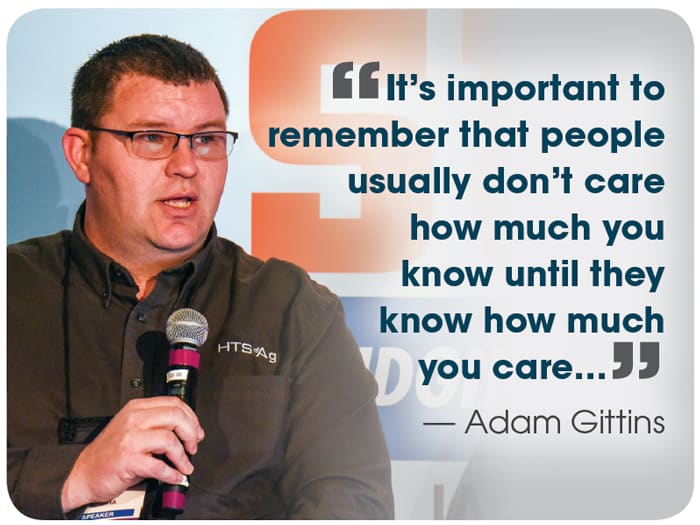
For example, Gittins recalls an occasion when he was passing the farm of a customer on the way home from a family road trip. He called Josh Johnson, who farms over 1,000 acres near Montgomery City, Mo., to ask if it’d be all right to drop in on him socially.
“My wife and kids were with me and we just stopped in to say hi,” says Gittins. “I went around and toured his farm and just got to spend some time outside of business. If you have those kinds of opportunities, I think that’s
really important.”
The personal touch adds another layer to their relationship, Johnson says, and leaves him with the feeling that he can count on Gittins in a “crisis.”
What Farmers Want From You: Pain Points and Precision Needs
Farmers are beginning to look even more closely to the dealer in an effort to seek out assistance with making the most of their precision technology. Learn about all the ways that you, as a dealer, can help your customers make the most of precision data in this free eGuide. Download now »
“I would like to think that there’s times where me and Adam probably haven’t spoken in 6 months because we’re both busy in our lives and don’t require anything from one another, but we both know we’re in each other’s back pocket if someone needs something,” says Johnson.
For Adam Fennig of Fennig Equipment in Coldwater, Ohio, building relationships with farmers gives him both an in-depth understanding of their needs and helps spread the word about his services.
“You need to focus on customer relationships,” he says. “If you can improve your customer’s quality of life, get to know them really well and be a stepping stone the helps them get to the next level, you will solidify sales with him and the word of mouth about what you’re doing will spread quickly.”
3. Follow-Up
After a sale is made or a farmer’s precision issue is addressed, the instinct, from a workflow perspective, is to cross that item off the to-do list. But precision specialists agree that there are gains to be made by circling back after some time has elapsed.
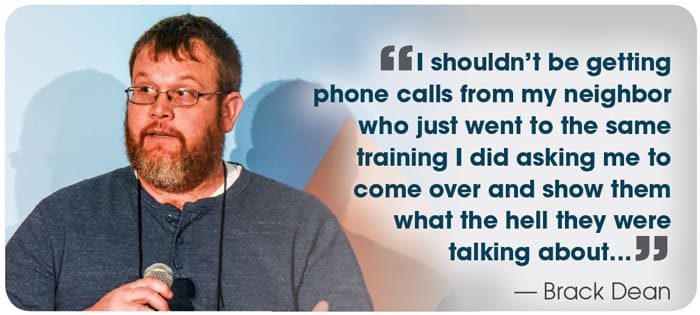
Fennig says following up keeps the line of communication perpetually open, which can head off future problems and even lock in future sales. He prefers to follow-up in person, rather than by phone, if there’s time.
“Don’t just call. If you can, go to their farm and ride around with them,” Fennig says. “They’ll ask you questions, maybe even about another product or service. If you build the trust and the respect with them, the sales will continue to come.”
4. Temper Expectations
While trying to make a sale, it’s unlikely that a precision specialist would say, ‘This equipment can be complicated to use and will require a large amount of your time to fully understand it and use effectively.’ But customers, especially those new to precision equipment, ought to know that using precision equipment on the farm can take some patience.
Fennig says getting the farmer to realize they may need to devote some time to educating themselves about their new equipment will result in a stronger end user.
“Precision equipment isn’t like a field cultivator where you can put it in the ground and it’s going to do a good job,” says Fennig. “Issues are usually more complicated than just putting a new pin in a tractor. You’ve got to get everything to jive. If you promise a lot of rosy things, you’re going to get a wake-up call.
“I think a lot of people have a similar first-time experience with precision farming. There’s a big learning curve. You’ve got to put in a lot of time and do your homework to make sure that when you get to the field, the equipment you bought is going to work properly.”
5. Encourage Autonomy
Offering help at every turn is imperative in a business relationship, but working to get precision customers to a level of confidence where they can troubleshoot their own seasonal issues is a good long-term strategy.
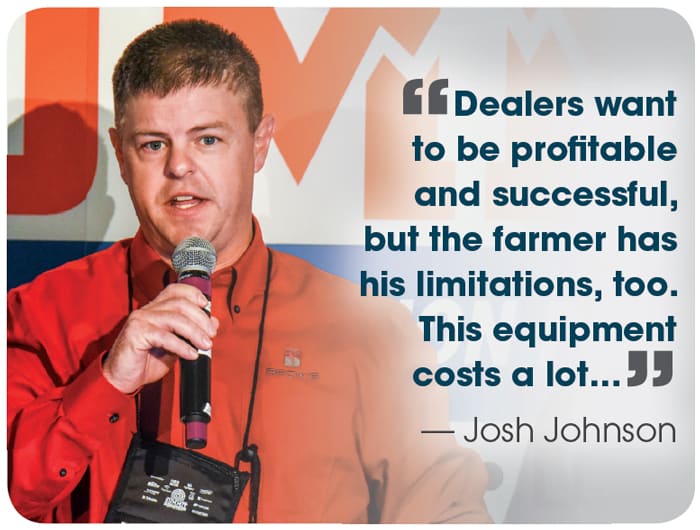
From a farmer’s perspective, Johnson says the confidence to attempt fixing his own issues comes from knowing he has a “safety net.” If he’s unsuccessful in working through the issue, help is still just a call away.
“Sometimes I hit a brick wall where you’ve used up all your resources,” Johnson says. “I feel like I have a safety net though, and that’s my avenue right up to the manufacturer or the supplier.
“I’m confident when I run into a problem that I’m going to be able to solve it myself, but everybody’s been through one of those problems they worry they’ll never be able to fix. Having back-up support is comforting.”
6. Educate Customers
An even faster route to customer confidence and autonomy is to actively educate them on the use of precision equipment.
While most dealerships host some type of seasonal training sessions, Hennings says he gets more mileage out of physically teaching farmers to use equipment rather than just demonstrating it. Van Horn Precision Technologies offers both a spring and fall clinic which usually attracts around 30 farmers.
“When you jump into the cab with a farmer, you shouldn’t just be reaching over immediately, pushing buttons and then jumping out,” Hennings says. “Teach them and let them learn. For us, it’s been getting easier every spring and fall because we’re actually educating them.”
Precision specialists agree that they’ve seen more success with smaller groups that stress interaction rather than dictation. Gittins says shorter, smaller conversation-based trainings often address more needs.
“Our training has shifted and we’re focused on smaller groups,” he says. “We try to do a 2-hour meeting and feed them lunch and leave some time open for questions. It’s important that you get that dialogue. You can sit and train them on what you think they might need to know, but if you don’t get feedback, you’re not going to solve their problems.”
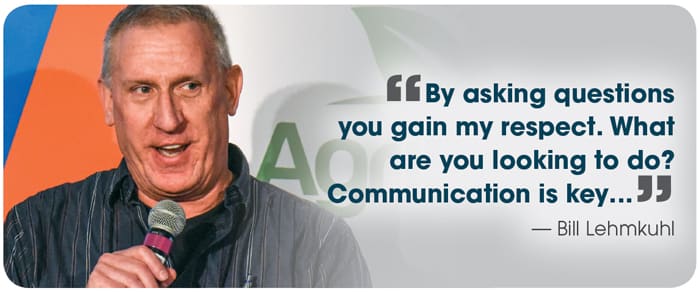
Although labor-intensive, sometimes making the most headway requires the smallest possible group: an audience of one. As a farmer, Dean says his peers can often come home from a training and struggle to apply what they learned to their operation.
“I shouldn’t be getting phone calls from my neighbor who just went to the same training I did asking me to come over and actually show them what the hell they were talking about,” Dean says. “Sometimes they need that one-on-one, interpersonal, go-to-their-shop and figure it out together type of help. The one-on-one is, by far, the most helpful training for farmers — old or young, it doesn’t matter.”
Gittins has even had success getting farmers to educate one another. By facilitating peer groups, he’s helped strengthen the businesses of his farmers, make them more shrewd precision users and give himself a deeper understanding of their needs.
“Our peer groups are made up of 8 to 10 geographically non-competing farmers from across the state or across a few states that get together quarterly,” says Gittins. “We’ve got two groups running now and we’re looking to start a third.
“We just have them in a meeting room, and it’s nothing magical that I’m sharing with them. By facilitating the conversation and helping them talk to each other, they can share business practices, benchmark financials and learn from one another. Being in the room allows me to deepen my relationship with them too.”
In the effort to get farmers up to speed on technology, the precision specialist’s own education shouldn’t be neglected. Staying abreast of the latest equipment developments is one thing, but learning the specifics of farming in a given region can take sales to the next level.
Bill Lehmkuhl, owner of Precision Agri Services and farmer of 3,000 acres in Minster, Ohio, says a precision specialist who knows both what their farmers need and what equipment fits those needs will make the most headway.
“In our area of Ohio, it’s nutrient management,” says Lehmkuhl. “Whether that’s in the Great Lake Watershed or I’m close to Lake St. Mary’s. We’re able to go to our guys and then present ideas to them. ‘What about variable-rating your manure?’ or ‘What about variable-rating your fertilizer and some of your nutrients?’ This leads to more technology and precision sales.”
7. Know Your Customer
Knowing the farmer will help a precision specialist focus sales and anticipate support requirements. Lehmkuhl says this starts at something as basic as asking questions.
“By asking questions you gain my respect,” he says. “Ask the farmer, ‘Where do you want to go in the future?’ ‘Where do you want to be down the road?’ ‘What are you looking to do?’ Communication is key.”
The simple question, ‘What’s your biggest obstacle to introducing more precision technology on your farm?’ would yield the answer ‘My dad and my uncle’ from Johnson. He says the 65 and 70-year-olds are of the “old school” when problems were fixed via nuts and bolts. They find delays and hang ups with precision equipment quite distressing.
“We just bought a 2150 Case IH planter with every bell and whistle on it, but I sat all day on an 80-acre field while my neighbor with an old White Farm Equipment tractor and a John Deere 7000 12-row planter out-planted me,” says Johnson. “My father goes, ‘I just spent all this money and that old piece of crap just whipped me?’”
Eventually, Case IH was able to bring out some engineers who ironed out a few software issues to get Johnson back up and running. Knowing a customer and their specific concerns can help anticipate these issues and allow for the opportunity orchestrate a better customer experience.
8. Be Money-Minded
Just focusing on the sale at hand using raw return on investment data is short-sighted for both dealer and farmer. It should be a dealer’s priority to sell the farmer the precision equipment best suited to their specific operation, says Johnson.
“Dealers want to be profitable and successful, but the farmer has his limitations, too. This equipment costs a lot,” he says. “We had fabulous corn yields in my neck of the woods last year, but money is still tight because of corn prices. Even if you’re showing us ROI spreadsheets and equations, it’s still hard to do anything when money is tight.
“When you’re trying to help these operators make a purchase, try to streamline it. Maybe they can get by with one system that moves around to different implements. Push for economical solutions.”
Of course, a dream customer is a progressive farmer with deep pockets who always wants the latest and greatest technology — but at times, that’s not realistic. Gittins says dealers should look for the precision equipment that will have the maximum impact on a given farmer’s field.
“There’s always the ‘We want more, we want it now and we want it better’ mentality on a lot of the technology out there,” says Gittins. “But we’ve got to be able to work within the realm of what we’ve got. We should be able to streamline and say, ‘Okay, Mr. Farmer. These are the 10 things you might need in your operation. Here’s the one that has the biggest return on investment. Here’s how we can utilize that and get the most bang for our buck.’”
Dealer Takeaways
Service calls may come at inconvenient times, but answering them can make all the difference.
Getting to know a farmer personally tunes you into their needs and builds a level of trust in your relationship.
Farmers can be trained to do some of their own tech troubleshooting through precision clinics, one-on-one attention and peer groups.
Related Content
- What Farmers Want From You: Pain Points and Precision Needs: Learn about all the ways that you, as a dealer, can help your customers make the most of precision data in this free downloadable eGuide.
- Building Customer Relations with Grower Peer Groups: HTS Ag in Harlan, Iowa, hits on a proven method for building customer relations while gleaning insight about top growers' precision needs.
- Dissecting the Dynamics of a Profitable Precision Partnership: Hear more from the panel of precision dealers and farm customers sharing their successes, challenges and tips for sustaining a mutually profitable, professional business partnership in exclusive “super session” video coverage from the 2018 Precision Farming Dealer Summit.
This article originally appeared in the Summer 2018 issue of Precision Farming Dealer magazine.

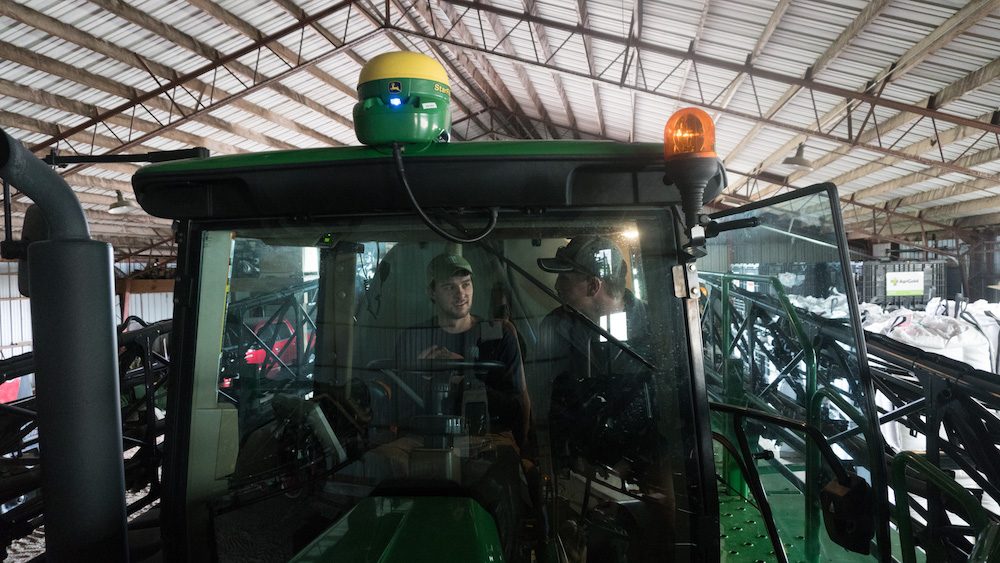


![[Technology Corner] Discussing AI’s Potential Impact on Service & Support](https://www.precisionfarmingdealer.com/ext/resources/2025/04/11/Discussing-AIs-Potential-Impact-on-Service--Support.png?height=290&t=1744385717&width=400)


